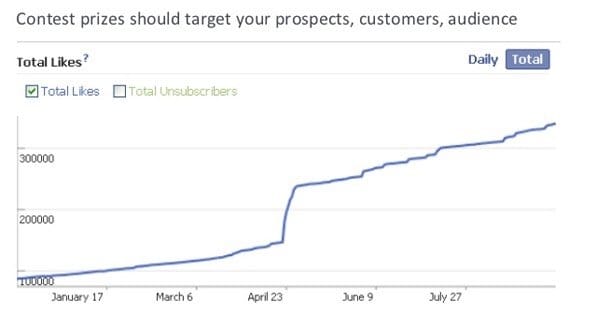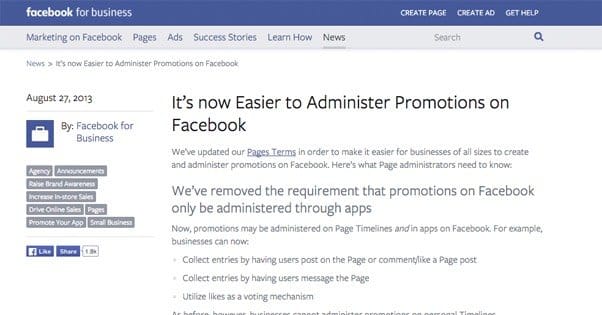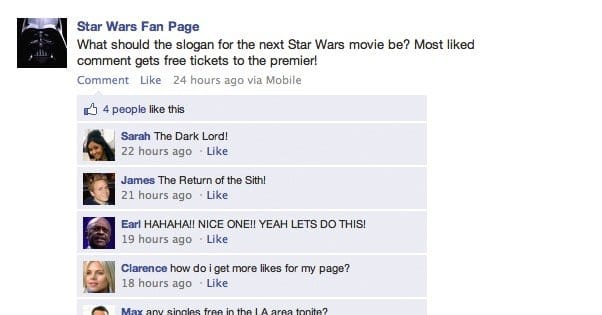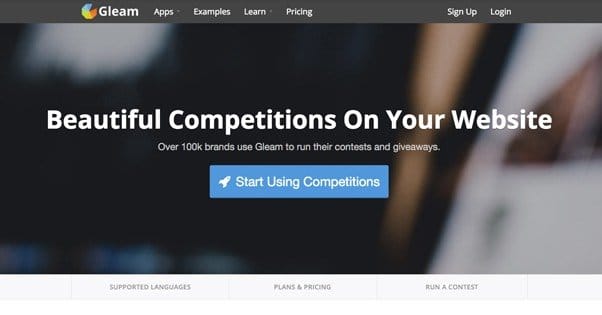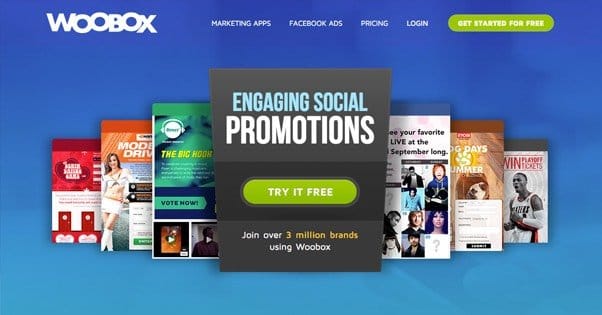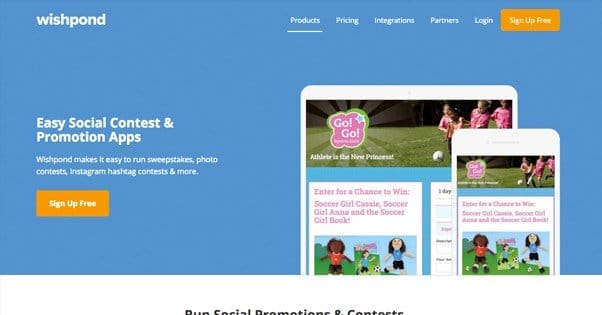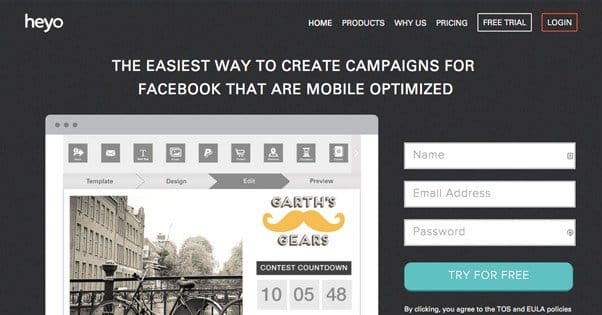 Written by ContentPowered.com
Written by ContentPowered.com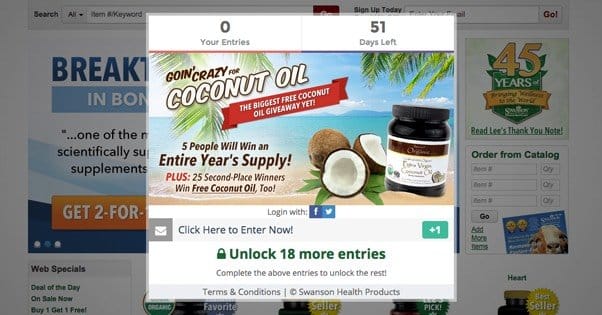
One common piece of advice for Facebook marketing is to run a contest. A good contest certainly can bring in a lot of traffic, and sometimes those people stick around. Let’s take it from the top, though, and analyze how contests can help your marketing.
How Contests Benefit You
When you run a Facebook contest, you are essentially selling a prize. Rather than a monetary entry fee, however, the currency you use is in engagement and likes. It all comes down to the type of action you require as an entry.
Most contests are simple. “Like and share this image and, if you’re following our page, you have a chance to win!” Any user who follows your page and performs the actions you request can win. All you have to do is set a deadline and pick a winner. And, of course, deliver the prize.
At the most basic level, contests grow your followers because people will like your page in order to qualify for the prize. If they can’t win when they aren’t following you, they’ll follow you for the possibility of getting free stuff.
You also gain engagement in the form of whatever you require for an entry. Maybe it’s a like and a share; those are both great, because they expand the audience that sees your post. Comments are great for engagement purposes but aren’t as good for exposure. Other actions, like storytelling or photo submission, can further enhance your engagement.
Engagement is great because it’s what fuels EdgeRank, or the modern Facebook equivalent to EdgeRank. EdgeRank is the name for the algorithm that Facebook uses to determine who sees your posts when you make them.
Essentially, when a user interacts with your page in some way – likes, comments, shares, follows, reviews, and even link clicks – it increases their EdgeRank rating with you. The longer they go without performing any of those actions, the less likely they are to see your posts.
A good contest requires some form of engagement and a follow in order to be entered to win. That means a contest is boosting EdgeRank ratings, which means people who participate will see your posts more often.
Some contests will also require some other forms of entry, up to and including a more detailed form. This allows you to harvest customized information about your audience, ranging from demographics to reviews and testimonials. You can also build a custom audience out of the people who responded, and use it for targeting ads.
Facebook’s Contest Guidelines
Now, it’s not easy to run a contest on Facebook. You have to follow some guidelines. Thankfully, Facebook dramatically toned down these guidelines a while back. It used to be that you were required to use a contest app, and the typical “like us to win” contest was potentially bannable. That’s right; trying to boost your engagement in a relatively benign way could have gotten you banned.
These days, you can run contests organically on your news feed, or you can run them within a dedicated contest app, or you can run them with a third party entry engine. I’ll talk about all of these methods later, under the apps section.
- Pages are allowed to collect contest entries by having users post on the page, or as comments or likes on a post.
- Pages are allowed to collect contest entries by having users message the page directly.
- Pages are allowed to use likes as a voting mechanism. For example, a page could upload three pictures and have users vote for which one is best via likes.
- Pages are NOT allowed to tag people or encourage people to tag others in pictures that do not include those people.
Do note that these guidelines apply specifically to pages, not to profiles. Personal profiles cannot be used to administer contests in any way. Facebook still finds this a bannable offense and can remove your personal profile for trying to run a contest natively. You can promote a contest run by a business, but you cannot run a contest yourself.
Ways to Run a Contest
There are, as I mentioned above, three ways to run a contest. Let’s take a look at the pros and cons of each, shall we?
First of all, the three ways to run a contest are organically on your page, through a contest app, or through a third party app that isn’t hooked into Facebook directly.
Of the three, the third option is the most intensive on your part, because it involves off-site promotion and management. The other two are handled through Facebook, though they might be usable in other locations as well. Because it’s not strictly a Facebook contest, I’m going to skip it.
The first is easy. Running a contest on your timeline is about the simplest possible thing you can do.
You just post about the contest and rack up engagement until the deadline. When the deadline is reached, you pick a winner, and it’s done. You don’t need any fancy software unless you really want to be careful with choosing your winner from a totally random selection. You can’t always rely on Facebook giving you a complete list of names, after all.
Of the three, then, the second option is the one we’re most interested in. Contest apps com in a variety of forms, and from a bunch of different providers. A bunch of companies make contest apps you can use.
The way a contest app works in Facebook is just like any other tab app. The app is hosted by a third party, generally the owner of the code that makes up the app. You customize the contest through their website or interface, and link it to your Facebook page. There, it becomes a tab app and landing page you can use as a destination for users.
Of course, these apps run the gamut of functionality and price. Let’s take a look at what’s available.
Contest Apps
My personal favorite contest app is Gleam. It creates a nice box with a bunch of different possible entry methods, so you can earn engagement throughout your marketing all around. I’ve seen everything from “like this page on Facebook” and “retweet this message on Twitter” to “join this Steam group” and “follow this account on Twitch.”
Each contest will have three boxes at the top. One is the number of entries the person logged in has accumulated. One is the total number of entries, so the user can calculate their chances if they wish. The third is the time left before the winner is chosen. It’s all customizable as well; you can assign different values for different actions, and you can customize those actions.
Each individual user will need to have various accounts they can allow Gleam to access. I have it enabled on both Facebook and Twitter right now on my personal accounts. You don’t have to worry about authentication or security, because Gleam takes care of it all.
Gleam comes in three pricing tiers. The free tier is, of course, free. It’s branded, though, rather than white label for your contests. You have no limit on competitions or entries, and fraud detection is standard. You also have the ability to search users and entries. Every type of entry option is available except email signups, so if you want to grow your newsletter you will have to upgrade. It also has those standard tack-on features in data exports, analytics, and embed functionality.
The pro plan is $39 per month and gives all of that plus image galleries, daily winners, manual choices for winners, custom landing pages, location restrictions, and a handful of other options. Finally, the business plan — $149 per month – is white label, gives you custom appearance controls, allows entry imports for hashtag use, has a custom API and integrates Google Analytics.
If Gleam isn’t to your liking, or if you prefer to customize your contest more, you can try out Woobox. Woobox isn’t just limited to contest apps, though; you can create promotions, quizzes, polls, fan gates, prize claims, and ads through the site.
Woobox is a much more variable and graphically-oriented app design studio. It has over 20 templates you can use as the base for an app, and then a broad range of customization options, above and beyond the basic color changing offered by Gleam.
The caveat is pricing. Only certain apps are available for free. These are the fangate, the Twitter tab, the Instagram tab, the Pinterest tab, the YouTube tab, and the Pick a Winner options. All of the rest are accessible from any paid account on any tier.
The paid accounts start at $30 per month and limit the number of participants, unless you pay the annual fee instead of the monthly fee. The $100 per month tier works on up to 5 pages, allows Javascript, and is white label. For $500 per month you get unlimited fans and participants with the monthly payments, you get a private domain, and you get support priority. The top-level $3,000 monthly app is unlimited in every way, has encrypted data, and allows invoicing.
You’ll probably never use anything above the $100 monthly tier. The $3,000 tier is clearly for agencies that represent hundreds of brands, and even then it’s a little much. Still, I can’t fault Woobox for asking for it, if someone out there is willing to pay it.
Wishpond has a similar set of contest and promotion apps. They have a sweepstakes app, a photo contest, a coupon claim app, an essay contest app, group offers, video contests, referral promotions and more. These are, if anything, even more customizable than Woobox’s offerings.
Wishpond’s pricing starts with a free plan that allows up to 200 leads and 1 manager for the contest. It has data imports, email and live chat support, landing pages, automation, form support, and more. Unfortunately, it doesn’t do the contests.
The next tier is $44 monthly, and includes up to 1,000 leads, adds in the social promotions, as well as split testing and custom design. The $77 tier is further increased in leads to 2,500, gives you up to 5 moderator slots, and gives you API access. The top tier $129 monthly plan starts at 10,000 leads and scales up the price from there.
Heyo is another option, with a drag and drop editor, unlimited fans, and a lot of other features. They used to be completely free, but have since added a $25 monthly fee. Check it out if somehow none of the other options are cutting it for you.
Types of Contests
Now you know what apps you can use, what about looking into the types of contests themselves? I’ve talked about voting contests and entries in raffles, but those are just some of the types of contests available. What else is out there?
- The Basic Raffle. Rack up entries in some way, either through a Gleam-like multi-entry system or a simple Facebook “like this to enter to win” contest. Wait a while for entries to pile in – but not so long that people forget about your contest or think it’s going on for far too long – and then pick a winner. With some apps you can have the winner chosen and notified automatically; with others you have to do it yourself. If you want, this same style of contest can be used for multiple prizes or even multiple tiers of prizes. Give away a computer system, a component, some software, some branded merch; whatever works for you.
- The Instant Win. This is a bit less like a raffle and a bit more like a slot machine or one of those fast food “put in a code and see if you win” systems. Put up an app that people can interact with to generate a specific code or chance to win. Some of them will win, many of them will not. I think these should be used sparingly, unless you have a reasonable consolation prize for everyone involved. It always feels bad to use these kinds of apps and win nothing. However, giving out a baseline code for 5% off your store or something, with the option of having better prizes, is a more compelling option.
- The Photo Contest. I like to do this one in stages. Ask your users to submit compelling photos to your photo contest. After a month or so – define the time frame up front, of course – you can pick a handful of potential winners. I like to limit it to either 3 or 5, but you can do as many as you like. Once you have picked some winners, either reward each of them with a prize, or hold a secondary vote contest to gain popular opinion on which is better – and a second stage of engagement. This is where some apps that cross-operate on Pinterest or Instagram can be a great help, and where hashtag-based data imports can be super useful.
- The Vote Contest. Put up two options and ask users to vote for which one they like best. You can do it by posting two images and having them like the one they like the best – though some people will vote for both to be contrarian – or run a poll where the user can vote for either option and the winner gets the prize.
- The Quiz. Ask a series of tough questions with a prize gated at the end of them. Be careful with this kind of contest, though. If your prize is good enough, people will go out of their way to either hack or crowdsource the answers. This is a good contest to use for small gift cards or store discounts, but it’s not a great contest to use for top-tier exclusive prizes.
- The Offer Claim. This is less of a contest and more of a time-sensitive offer. Just have, say, 10,000 coupon codes or 100 gift cards up for grabs, and ask users to do something to claim one for themselves.
- The Caption Contest. Post a picture and ask people to caption it. Go through the entries and determine which one is your favorite, or the favorite among the office at large. Reward the winner. You can do this with multiple judges and a prize for each judge to give a larger audience more of a chance.
One final note. When you’re selecting prizes for a contest, be very aware of what you pick. The way I like to put it is this: if your prize is a laptop, the people coming to your page just want a laptop. If your prize is your product, the people entering your contest are actually people who want your product. One of those groups is significantly more valuable to you than the other. Choose wisely.
